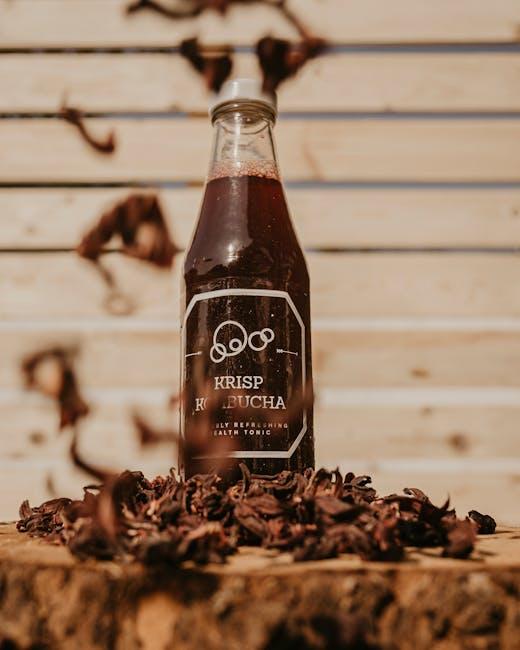Welcome to a world where ancient tradition meets modern wellness – the realm of kombucha. This effervescent elixir has been captivating taste buds and sparking curiosity for centuries. But what exactly is kombucha? Join us on a journey of exploration as we unravel the mysteries, origins, and potential health benefits of this intriguing fermented tea. Whether you’re a seasoned sipper or a curious newcomer, prepare to dive deep into the fizzy, tangy universe of kombucha.
Table of Contents
- Unraveling the Mystery of Kombucha
- The Science Behind Kombucha and Its Health Benefits
- Different Types of Kombucha and How to Choose the Best One
- Expert Tips for Brewing Your Own Kombucha at Home
- Q&A
- Wrapping Up
Unraveling the Mystery of Kombucha
Kombucha, a fizzy fermented tea with an intriguing history and a tangy taste, has been gaining popularity as a health elixir in recent years. This centuries-old beverage is thought to have originated in East Asia and has since made its way into the cups of health-conscious enthusiasts worldwide, thanks to its many potential benefits.
So, what exactly is kombucha? In simple terms, kombucha is a symbiotic culture of bacteria and yeast (SCOBY) that is added to sweetened tea and left to ferment. During the fermentation process, the SCOBY metabolizes the sugar and produces a variety of compounds that give kombucha its distinctive flavor and potential health properties. From probiotics to antioxidants, kombucha is a beverage that offers a unique blend of taste and potential wellness benefits.


The Science Behind Kombucha and Its Health Benefits
Kombucha is a centuries-old fermented tea that has recently gained immense popularity for its numerous health benefits. This ancient elixir is brewed by fermenting sweetened tea with a symbiotic culture of bacteria and yeast, commonly known as a SCOBY. The fermentation process produces a tangy, fizzy beverage that is not only delicious but also packed with probiotics and antioxidants.
Studies have shown that kombucha can contribute to improved digestion, boosted immunity, and increased energy levels. This fizzy drink is also rich in vitamins B and C, as well as beneficial organic acids. Consuming kombucha regularly may help in detoxifying the body, reducing inflammation, and promoting overall gut health. With its refreshing taste and health-boosting properties, it’s no wonder why kombucha has become a favorite among health-conscious individuals.


Different Types of Kombucha and How to Choose the Best One
Kombucha, a fermented tea that has been gaining popularity in recent years, comes in various types with unique flavors and health benefits. When choosing the best kombucha for you, consider factors such as taste preferences, caffeine content, and desired health benefits. Here are some different types of kombucha to help you make an informed choice:
- Original Kombucha: This classic version of kombucha is made from black or green tea, sugar, and a SCOBY (symbiotic culture of bacteria and yeast). It has a tangy flavor with a slightly effervescent quality.
- Fruit-Infused Kombucha: For those who prefer a sweeter taste, fruit-infused kombucha is a great option. Flavors like raspberry, lemon, or mango add a refreshing twist to the traditional kombucha taste.
- Herbal Kombucha: Herbal kombucha blends are made by infusing the tea with herbs like lavender, ginger, or mint. These variations offer unique flavor profiles and potential health benefits.
| Kombucha Type | Key Feature |
|---|---|
| Original Kombucha | Tangy flavor and effervescent quality |
| Fruit-Infused Kombucha | Sweet and fruity taste with refreshing options |
| Herbal Kombucha | Unique herbal blends for diverse flavor profiles |
Exploring the diverse world of kombucha can be an exciting journey filled with flavor discoveries and potential health benefits. Whether you enjoy the traditional tang of original kombucha or prefer the sweetness of fruit-infused varieties, there’s a kombucha out there to suit every palate. Remember to experiment with different types to find your favorite and savor the goodness of this probiotic-rich beverage.


Expert Tips for Brewing Your Own Kombucha at Home
Interested in making your own delicious and fizzy kombucha at home? Look no further for expert tips to guide you through the process. With a few simple ingredients and a bit of patience, you can become a kombucha brewing pro in no time!
First things first, gather your supplies: **tea bags** (black, green, or a combination of both), **sugar**, a **glass jar**, a **SCOBY** (symbiotic culture of bacteria and yeast), and **filtered water**. Boil the water, steep the tea, dissolve the sugar, and let the mixture cool. Once cooled, add the SCOBY, cover with a cloth secured with a rubber band, and let it ferment for 7-14 days. Experiment with different flavors by adding fruit, herbs, or spices during a second fermentation for an extra kick of taste!
Q&A
—Q: What is kombucha and where does it come from?
A: Kombucha is a fermented tea beverage that has been enjoyed for centuries across various cultures. It is believed to have originated in Northeast China during the Qin Dynasty and later spread to Russia and Europe.
Q: How is kombucha made?
A: Kombucha is made by fermenting sweetened tea with a symbiotic culture of bacteria and yeast (SCOBY). The fermentation process typically takes 7-14 days, during which the SCOBY consumes the sugar and produces beneficial compounds such as probiotics and organic acids.
Q: What does kombucha taste like?
A: Kombucha has a slightly tangy and effervescent flavor profile with hints of sweetness depending on the brewing technique and added flavors. It can range from mildly sour to refreshingly tart, making it a popular choice for those seeking a unique beverage experience.
Q: What are the health benefits of kombucha?
A: Kombucha is often touted for its potential health benefits, including improved digestion, strengthened immune system, and increased energy levels. It is also rich in antioxidants and probiotics, which can support gut health and overall well-being.
Q: Can kombucha be made at home?
A: Yes, kombucha can be brewed at home with the right ingredients and equipment. Many enthusiasts enjoy experimenting with different teas, flavors, and fermentation times to create their own customized batches of this probiotic-rich beverage.
Q: Is kombucha alcoholic?
A: While kombucha is typically low in alcohol content (usually below 0.5% ABV), some commercial varieties may contain slightly higher levels due to the fermentation process. However, most store-bought kombuchas are considered non-alcoholic and safe for all ages.
Q: Where can I buy kombucha?
A: Kombucha is widely available in health food stores, grocery stores, and online retailers. You can choose from a variety of brands and flavors or explore local farmers’ markets and artisanal shops for unique artisanal brews.
Q: How can I incorporate kombucha into my diet?
A: Kombucha can be enjoyed on its own as a refreshing beverage or used as a base for creative cocktails and mocktails. You can also use kombucha in smoothies, salad dressings, marinades, and even desserts to add a probiotic boost to your favorite recipes.
Feel free to customize and expand on these questions for your article about kombucha. Let me know if you need more assistance!
